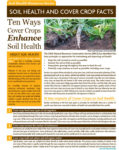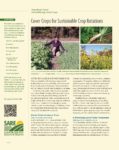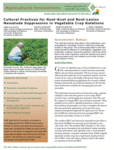Showing 1-6 of 6 results

10 Ways Cover Crops Enhance Soil Health
Soil health is a hot topic these days, one that is justifiably receiving considerable attention from farmers and their farm advisors. This short fact sheet highlights some of the key ways that cover crops improve soil health by influencing the biological and physical characteristics of the soil.

Cover Crops for Soil Health Workshop
All session recordings and slide presentations from this three-day professional development workshop are available online. Hosted by Northeast SARE and Delaware State University in March 2016, this event addressed the latest research on the benefits and successful management of cover crops in grain, vegetable and animal production systems.
Cover Crop Cocktails
Mitch Hunter (Penn State University) discusses the principles of how to assemble different cover crop species into a successful cocktail based on farm management objectives, crop rotation restraints, and which cover crop species traits are complementary.

Cover Crops for Sustainable Crop Rotations
Cover crops are one of the best ways to improve soil health, reduce off-farm inputs and protect natural resources. Find a wealth of educational materials developed out of decades of SARE-funded cover crop research.

2014 National Conference on Cover Crops and Soil Health
All session recordings and slide presentations from the National Conference on Cover Crops and Soil Health are available online. Held in 2014 in Omaha, Neb., the event brought together 300 agricultural leaders and innovators to explore how we can make American agriculture more sustainable through improved soil health. Attendees represented agricultural industry, the farm community, academia, government, commodity and conservation organizations.

Cultural Practices for Root-Knot and Root-Lesion Nematode Suppression in Vegetable Crop Rotations
This publication discusses the use of non-host crops, sorghum sudangrass and castor bean grown as cover crops, RKN-resistant crops, and the application of poultry litter (PL) and PL compost to manage RKN and root-lesion nematode.